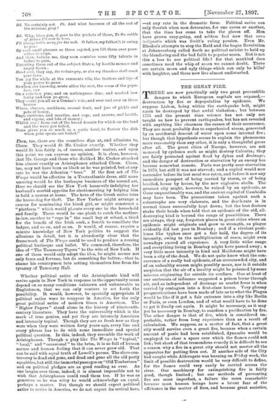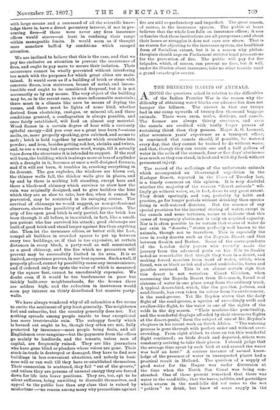THE GREAT FIRE.
THERE are now practically only two great preventible dangers to which European capitals are exposed,— destruction by fire or depopulation by epidemic. We suppose Lisbon, being within the earthquake belt, might again be destroyed by that awful visitation ; but between 1755 and the present time science has not only not taught us how to prevent earthquakes, but has not revealed with anything like clearness the causes of their occurrence. They are most probably due to superheated steam, generated by an accidental descent of water upon some internal fire ; but though that hypothesis seems to explain the phenomena more reasonably than any other, it is only a thoughtful guess after all. The great cities of Europe, however, are not menaced by cyclones such as might destroy Calcutta; they are fairly protected against flood by dykes and drainage; and the danger of destruction or starvation by an enemy has become somewhat remote. Paris was pretty near starvation in 1870, but still it was not starved ; and a capital would now surrender before its last meal was eaten, and before it saw any immediate prospect of being carried by storm, or of being levelled, house by house, by the new explosive shells. The greatest city might, however, be ruined by an epidemic, as G our unquestionably was, and the ancient capital of Cambodia may have been. The precautions taken against such a catastrophe are very elaborate, and the death-rate is in normal times successfully kept down; but the best doctors shake their heads when told that an epidemic of the old, all. destroying kind is beyond the range of possibilities. There are always, they say, forgotten places in great cities where an epidemic might originate and grow to strength, as plague evidently did last year in Bombay ; and if a virulent pesti- lence like typhus once got a fair hold, the degree of its intensity, owing to the multiplication of cases, might even nowadays exceed all experience. A very little wider range and everything living in Bombay might have passed away ; a very little more intensity in kind and Maidstone might have been a city of the dead. We do not quite know what the con- currence of a really bad epidemic, of an overcrowded city, and of an unhealthy season might possibly mean, nor is it outside suspicion that the air of a locality might be poisoned by some miasma originating far outside its confines. One at least of our outbursts of influenza suggested a poison borne through air, and as independent of drainage as scarlet fever is when carried by contagion into a first-class house. Very gloomy prognostications have been made of late as to what the Plague would be like if it got a fair entrance into a city like Berlin or Paris, or even London, and of what would have to be done to get it finally out again. It might be necessary, as it may yet be necessary in Bombay, to sanction a purification by fire. The other danger is that of fire, which is considered im- probable, rather from long experience than as a result of calculation. We suppose, as a matter of fact, that a great city would survive even a great fire, because when a certain amount of panic had been established, dynamite would be employed to clear a space over which the flames could not lick; but short of that tremendous remedy it is difficult to see a reason why a fire in a great city should not master all the apparatus for putting fires out. If another side of the City had caught while Aldersgate was burning on Friday week, the limit of possible destruction would be very difficult to define, for the flames could very easily be carried across the river. Our machinery for extinguishing fire is fairly good, though limited ; but our methods of preventing fire are most imperfect, a failure the more remarkable because most human beings have a latent fear of the offchance in the matter of fires, and because great societies,
with large means and a command of all the scientific know- ledge there is, have a direct pecuniary interest, if not in pre- venting fires—if there were never any fires insurance offices would starve—at least in confining their range within manageable limits. It would seem as if thought were somehow baffled by conditions which escaped attention.
We are inclined to believe that this is the case, and that we pay too exclusive an attention to prevent the occurrence of
fires, and ought to pay more to secure their isolation. Their occurrence cannot be wholly prevented without interfering too much with the purposes for which great cities are main- tained. It would seem as if a building of brick or stone with concrete floors, iron staircases, beams of metal, and incom- bustible roof ought to be considered fireproof, but it is not necessarily so by any means. The very object of the building may be, as in the recent case, to store inflammable materials; there must in a climate like ours be means of drying the rooms, and there must be lights of some kind, whether derived from electricity, coal-gas, or mineral oil, and those conditions granted, a conflagration is always possible, and once fairly established, will feed on almost any material. Wood flames in a certain degree of heat with a curiously spiteful energy—did you ever see a great tree burn P—stone melts, or, more properly speaking, gets calcined, and seems to melt ; brick is held together by mortar which crumbles into powder; and iron, besides getting red-hot, shrinks and twists, and, to use a wrong but expressive word, warps, till it actually tears down the structures it is intended to support. If the roof will burn, the building, which is always more or less of a cylinder with a draught in it, becomes at once a well-designed furnace, and if it will not burn, it tumbles in, crushing everything in its descent The gas explodes, the windows are blown out, the thinner walls fall, the thicker walls give in places, and by and by there is nothing left standing, except here and there a blackened chimney which survives to show how the ruin was originally designed, and to give builders the hint which they are so slow to take, how fire, when it cannot be prevented, may be restricted in its ravaging course. The survival of chimneys we would suggest, as non-professional observers, shows the possibility of effective precaution. The grip of fire upon good brick is only partial, for the brick has been through it all before, is inoculated, in fact, like a small- pox patient who has survived his attack ; good chimneys are built of good brick and stand longer against fire than anything else. Then let the insurance offices, or better still, the Law, compel all builders in crowded spaces to put up between every two buildings, or, if that is too expensive, at certain distances in every block, a party-wall as well constructed as a good chimney, and the fire which no precaution will prevent may be successfully limited in its area. It is so limited, as experience proves, in our best squares. Such a wall, if properly placed, cannot by possibility cause any inconvenience, and if ordered only for spots the value of which is measured by the square foot, cannot be unendurably expensive. We doubt even if it would be too burdensome in poor but thickly built-over neighbourhoods, for the houses there are seldom high, and the reduction in insurances would soon pay interest on thinly distributed but massive party- walls.
We have always wondered why of all calamities a fire seems to excite the sentiment of pity least generally. The neighbours feel and subscribe, but the country generally does not. Yet nothing spreads among people unable to bear exceptional loss more irretrievable ruin. The unhappy family which is burned out ought to be, though they often are not, fully protected by insurance—most people being fools, and all Englishmen over-sanguine—but the payments from the offices go mainly to landlords, and the tenants, unless men of capital, are frequently ruined. They are like journalists who have gone blind or pleaders whose voices are gone. Their stock-in-trade is destroyed or damaged, they have to find new buildings in less convenient situations, and nobody in busi- ness will or can wait till they have re-established themselves. Their connection is scattered, they fall "out of the groove," and unless they are persons of unusual energy they are forced down for life into lower positions. They are, too, apt to be silent sufferers, being unwilling to discredit themselves, and appeal to the public less than any class that is ruined by nusfortune----nne reason among many why precautions against fire are still so perfunctory and imperfect. The great reason, of course, is the insurance system. The public at heart believes that the whole loss falls on insurance offices ; it sees or fancies that those institutions are all prosperous ; and about their losses or struggles it does not care one straw. That is no reason for objecting to the insurance system, the healthiest form of Socialism extant, but it is a reason why philan- thropists should urge on Parliament stricter legal precautions for the prevention of fire. The public will pay for fire brigades, which, of course, can prevent no fires, but it will. under its illusion about insurance, take no other trouble until a grand catastrophe occurs.







































 Previous page
Previous page